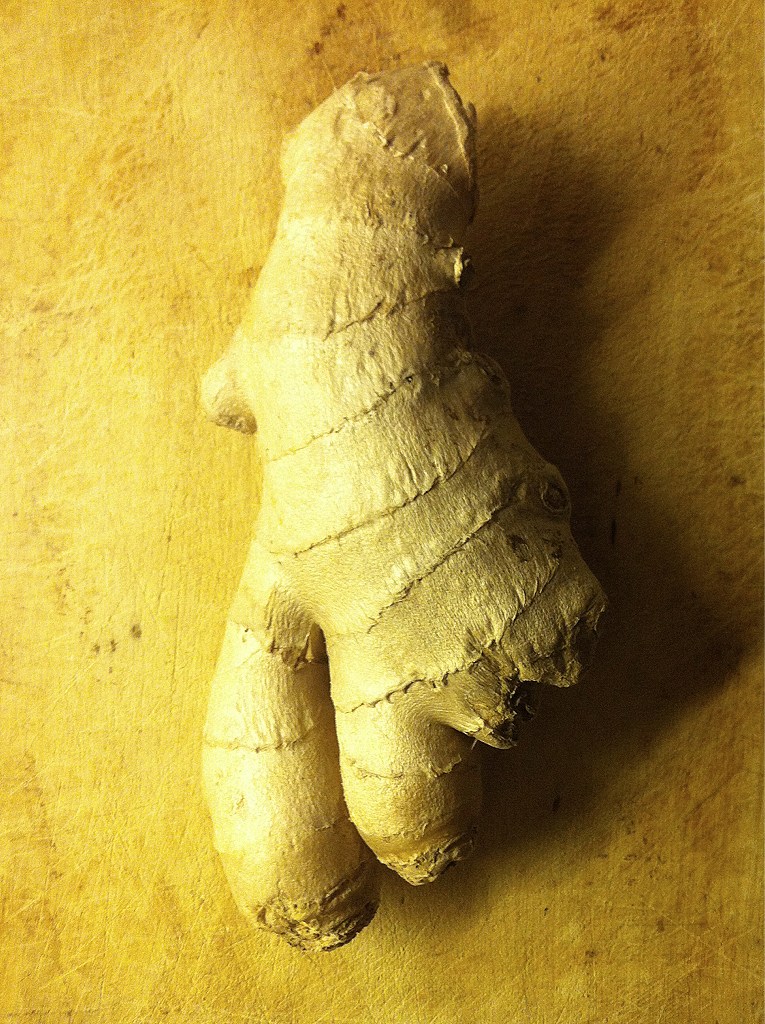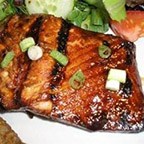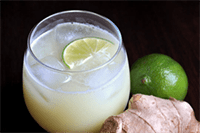Ginger – A Hidden Gem In Your Spice Cabinet
We are all very familiar with ginger. In the spice cabinet, as ginger ale, with sushi dishes, and in candies or desserts, this spice is an everyday staple, or at least a well-known flavor for most of us in one way or another. In addition to adding a bit of sweet, tangy bite to our cooking, ginger can have many excellent benefits to our health when regularly incorporated into the diet.
With its name derived from the Greek, “zingiberis,” ginger root (Zingiber officinale) is indigenous to Southern China and was gradually  spread to other areas of Asia, and eventually, to West Africa and the Caribbean. It grows primarily in tropical climates, but has been exported throughout the world as a valued spice and medicinal. It has long been a staple of Chinese, Asian, and Indian cuisines, but began to be exported to Europe in the first century AD through the lucrative spice trade.[ref]http://en.wikipedia.org/wiki/Ginger[/ref]
spread to other areas of Asia, and eventually, to West Africa and the Caribbean. It grows primarily in tropical climates, but has been exported throughout the world as a valued spice and medicinal. It has long been a staple of Chinese, Asian, and Indian cuisines, but began to be exported to Europe in the first century AD through the lucrative spice trade.[ref]http://en.wikipedia.org/wiki/Ginger[/ref]
In a previous blog, I gave you a simple recipe for incorporating Turmeric into your diet. Turmeric, interestingly, is a member of the same family of plant species and, like ginger, has been prized as a spice and medicinal throughout Asia for centuries. Ginger and turmeric have both been used in Chinese Herbal Medicine for more than a millenium as a means to address a wide array of of health concerns. Both of these spices have potent anti-inflammatory effects, and which can enhance one another when used in combination in cooking.
Here are just some of the benefits currently associated with ginger:
Nausea – Far and away, the most common and best studied effects of ginger are its benefits on nausea. The scientific consensus on these effects is exceptionally strong based upon several studies. [ref]http://www.ncbi.nlm.nih.gov/pubmed/10793599[/ref][ref]http://www.ncbi.nlm.nih.gov/pubmed/16389016[/ref] In addition, ginger has been studied and found to be effective for nausea due to specific causes.
• Motion sickness – Backed by several studies, one of which involved 80 beginner-level
sailors who were prone to motion sickness. The half given powdered ginger experienced a significant reduction in vomiting and cold sweats compared to the placebo group.[ref]http://www.umm.edu/altmed/articles/ginger-000246.htm[/ref]
• Morning sickness – One of the earliest-known uses for ginger has been in treatment of the morning sickness that accompanies pregnancy. In one study, a group of pregnant women were given 125mg of ginger extract four times daily, which conferred a significant reduction of symptoms compared to placebo. These effects have been found in several other studies.[ref]http://www.ncbi.nlm.nih.gov/pubmed/15802416[/ref][ref]http://www.ncbi.nlm.nih.gov/pubmed/11275030[/ref][ref]http://www.ncbi.nlm.nih.gov/pubmed/12233808[/ref][ref]http://www.ncbi.nlm.nih.gov/pubmed/15051552[/ref][ref]http://www.ncbi.nlm.nih.gov/pubmed/14712970[/ref]
Inflammation – Based upon the results of several studies, ginger consumption seems to have a pronounced effect on several types of inflammatory markers. This has been found to be particularly useful in relation to osteoarthritis[ref]http://www.ncbi.nlm.nih.gov/pubmed/22308653[/ref][ref]http://www.ncbi.nlm.nih.gov/pubmed/10607493[/ref] If you read my previous blog entry on the anti-inflammatory effects of turmeric, this is not surprising since ginger and turmeric are members of the same family of plant species. It is likely that consuming ginger and turmeric in combination may have a significant synergistic effect upon inflammation.[ref]http://www.examine.com/supplements/Ginger/[/ref]
Colon cancer prevention – though it has not yet been well-studied and more evidence is needed, preliminary studies have found a reduction in colon cancer risk in association with ginger consumption.[ref]http://www.ncbi.nlm.nih.gov/pubmed/21990307[/ref]
The benefits listed above are just the ones that have been studied more extensively. There are currently many other potential benefits to consuming ginger that may become more apparent once there is more evidence available. If you’re currently struggling with nausea or other digestive issues, are dealing with inflammation (nearly everyone falls into this category), especially inflammation from osteoarthritis, are at risk for or interested in preventing colon cancer, or just interested in the general maintenance of good health, perhaps adding a little ginger into your recipes a few times per week will give your health the kick you’ve been looking for.
Delicious ways to get more ginger into your diet
If you’re looking for ways to add more ginger into your daily rotation, it can be an excellent addition to all sorts of recipes, especially soups and stir-fries. Here are some of my favorites:
What are some of your favorite ginger recipes?



